be going to的用法
be going to
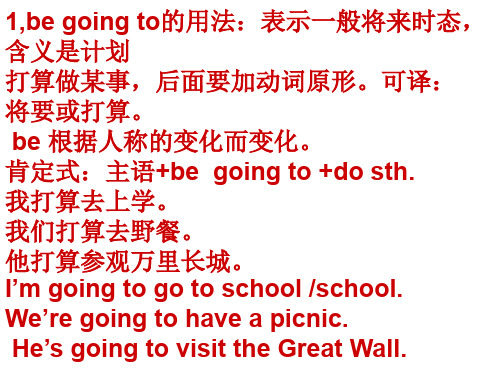
肯定回答和否定回答:
Yes ,we are ./No ,we aren’t. Yes ,she is ./No, she isn’t. 特殊疑问句:疑问词+一般疑问句。 我们打算什么时候吃呀? When are we going to eat ?
在询问时间时,有两种表达方式: What time is it ? What is the time?
It will wind。(动词) It will be windy.(形容词词) There will be wind.(名词)
在读时间时,也有两种读法:
顺读法:11:15 12:30 1:50
1,eleven fifteen 2,twelve thirty 3, one fifty
逆读法,11:15 1,a fifteen /quarter past eleven 12:30 2, half past twelve 1:50 3, ten to two
We’re going to have a picnic.
He’s going to visit the Great Wall.
否定式:主语+be not going to +do sth. 我们不打算去野餐。
We’re not going to have a picnic.
疑问句:Be+主语+ going to +do sth ? 你们打算吃早饭吗? Are you going to have breakfast ? 她打算学英语吗? Is she going to learn English?
1,be going to的用法:表示一般将来时态, 含义是计划 打算做某事,后面要加动词原形。可译: 将要或打算。 be 根据人称的变化而变化。 肯定式:主语+be going to +do sth. 我打算去上学。 我们打算去野餐。 他打算参观万里长城。 I’m going to go to school /school.
be going to 句型的用法

be going to 句型的用法1. 意义:be going to是"一般将来时"的一种表现形式,表示将来某个时间将要发生的动作或存在的状态,意思为"打算,将要"。
其中"be"会根据主语的人称变化成"is,am,are"等形式。
"to"跟在它后面的动词必须是动词原形。
通常和tomorrow, thisevening(week/ year…), next week(Sunday…)等连用2. 结构:主语+be(am/is/are)+going to+动词原形(系动词(am/is/are)的用法:我(I)用am,你(you)用are, is 连着他(he)她(she)它(it),凡是复数都用are)3.肯定句:主语+be(am/is/are)+going to +动词原形A.He is going to buy a book after school.B. I am going to climb mountains.4.否定句:在系动词(am/is/are)后+notA. He isn’t going to buy a book after school.5.一般疑问句:Be+主语+going to +动词原形(把系动词提到主语前面)A.Is he going to buy a book after school? -----No, he isn’t.B.Are you going to climb mountains? ------Yes, I am.(变一般疑问句时,第一人称变为第二人称)6.特殊疑问句:疑问词+be +主语+going to +动词原形He is going to have a picnic next Sunday. 下个星期天他打算去野餐。
---What is he going to do next Sunday?----When is he going to have a picnic?。
be going to 的用法
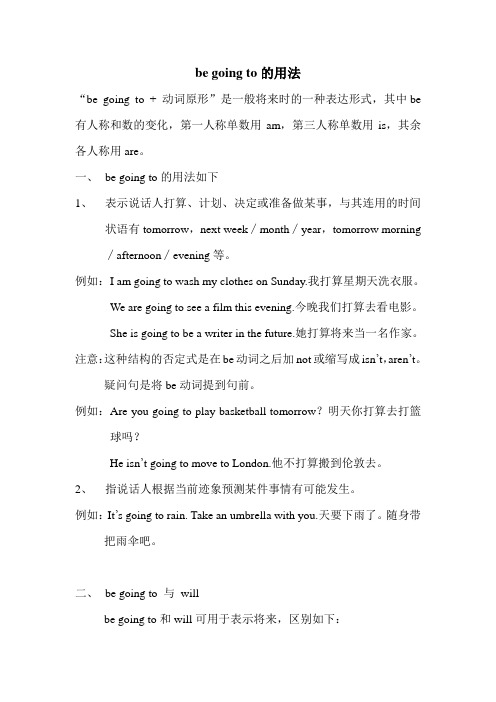
be going to的用法“be going to + 动词原形”是一般将来时的一种表达形式,其中be 有人称和数的变化,第一人称单数用am,第三人称单数用is,其余各人称用are。
一、be going to的用法如下1、表示说话人打算、计划、决定或准备做某事,与其连用的时间状语有tomorrow,next week∕month∕year,tomorrow morning∕afternoon∕evening等。
例如:I am going to wash my clothes on Sunday.我打算星期天洗衣服。
We are going to see a film this evening.今晚我们打算去看电影。
She is going to be a writer in the future.她打算将来当一名作家。
注意:这种结构的否定式是在be动词之后加not或缩写成isn’t,aren’t。
疑问句是将be动词提到句前。
例如:Are you going to play basketball tomorrow?明天你打算去打篮球吗?He isn’t going to move to London.他不打算搬到伦敦去。
2、指说话人根据当前迹象预测某件事情有可能发生。
例如:It’s going to rain. Take an umbrella with you.天要下雨了。
随身带把雨伞吧。
二、be going to 与willbe going to和will可用于表示将来,区别如下:1、be going to表示“打算,计划”,will则表示“意愿”。
例如:He’s going to be an actor.他打算当名演员。
I will help her do the chores.我要帮她做些家务。
2、表示将来必然发生的事情应用will,而不用be going to。
例如:He will be thirteen next year.明年他将13岁了。
be going to 用法使用

• be going to +来的tomorrow, next year等时间状语 或when 引导的时间状语从句连用。 • 各种句式变换都借助be 动词完成,be随主语有 am, is, are 的变换,going to 后接动词原形。 • 肯定句: 主语 + be going to + 动词原形 + 其他。 eg: He is going to take the bus there. • 否定句: 主语 + be not going to + 动词原形 + 其 他 eg:I’m not going to see my friends this weekend.
be going to 的用法
• 1.如果表示计划去某地,可直接用 be going to + 地点 We are going to Beijing for a holiday.
• 2.表示位置移动的动词,如go , come, leave 等常用进行时表示将来。 The bus is coming. My aunt is leaving for Beijing next week.
• 一般疑问句: Be + 主语 + going to + 动词原形 + 其他? 肯定回答: Yes, 主语 + be. 否定回答: No, 主语 + be not.
be going to 的用法
eg: Are you going to see your friends this weekend? Yes ,I am. / No, I’m not. 特殊疑问句: 疑问词 + be + 主语 + going to + 动 词原形 + 其他? eg: What is he going to do this weekend? When are you going to see your friends?
be going to 用法讲解
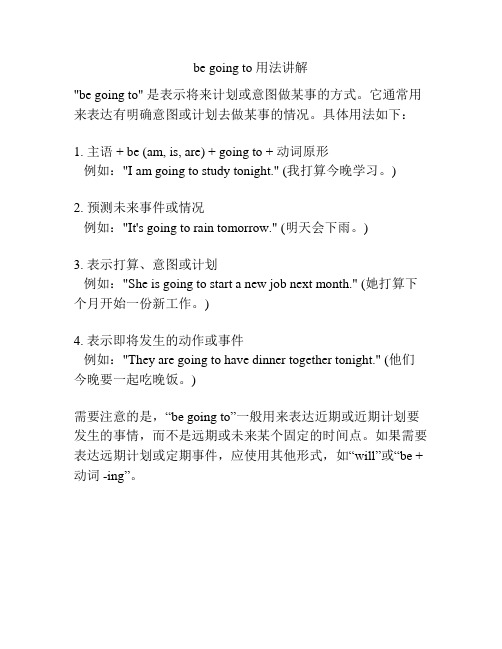
be going to 用法讲解
"be going to" 是表示将来计划或意图做某事的方式。
它通常用来表达有明确意图或计划去做某事的情况。
具体用法如下:
1. 主语 + be (am, is, are) + going to + 动词原形
例如:"I am going to study tonight." (我打算今晚学习。
)
2. 预测未来事件或情况
例如:"It's going to rain tomorrow." (明天会下雨。
)
3. 表示打算、意图或计划
例如:"She is going to start a new job next month." (她打算下个月开始一份新工作。
)
4. 表示即将发生的动作或事件
例如:"They are going to have dinner together tonight." (他们今晚要一起吃晚饭。
)
需要注意的是,“be going to”一般用来表达近期或近期计划要发生的事情,而不是远期或未来某个固定的时间点。
如果需要表达远期计划或定期事件,应使用其他形式,如“will”或“be + 动词 -ing”。
be going to的用法
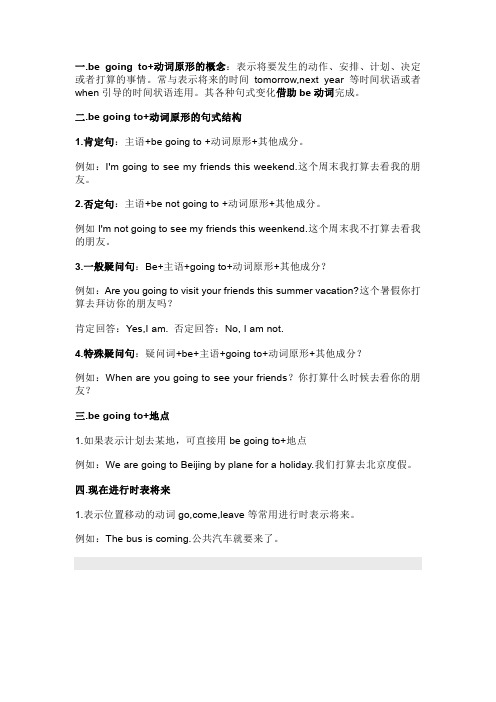
一.be going to+动词原形的概念:表示将要发生的动作、安排、计划、决定或者打算的事情。
常与表示将来的时间tomorrow,next year等时间状语或者when引导的时间状语连用。
其各种句式变化借助be动词完成。
二.be going to+动词原形的句式结构1.肯定句:主语+be going to +动词原形+其他成分。
例如:I'm going to see my friends this weekend.这个周末我打算去看我的朋友。
2.否定句:主语+be not going to +动词原形+其他成分。
例如I'm not going to see my friends this weenkend.这个周末我不打算去看我的朋友。
3.一般疑问句:Be+主语+going to+动词原形+其他成分?例如:Are you going to visit your friends this summer vacation?这个暑假你打算去拜访你的朋友吗?肯定回答:Yes,I am. 否定回答:No, I am not.4.特殊疑问句:疑问词+be+主语+going to+动词原形+其他成分?例如:When are you going to see your friends?你打算什么时候去看你的朋友?三.be going to+地点1.如果表示计划去某地,可直接用be going to+地点例如:We are going to Beijing by plane for a holiday.我们打算去北京度假。
四.现在进行时表将来1.表示位置移动的动词go,come,leave等常用进行时表示将来。
例如:The bus is coming.公共汽车就要来了。
be going to的用法
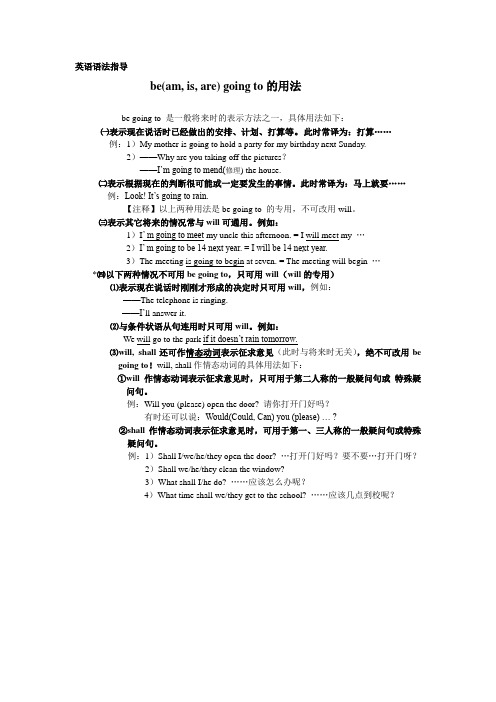
英语语法指导be(am, is, are) going to的用法be going to 是一般将来时的表示方法之一,具体用法如下:㈠表示现在说话时已经做出的安排、计划、打算等。
此时常译为:打算……例:1)My mother is going to hold a party for my birthday next Sunday.2)——Why are you taking off the pictures?——I’m going to mend(修理) the house.㈡表示根据现在的判断很可能或一定要发生的事情。
此时常译为:马上就要……例:Look! It’s going to rain.【注释】以上两种用法是be going to 的专用,不可改用will。
㈢表示其它将来的情况常与will可通用。
例如:1)I’ m going to meet my uncle this afternoon. = I will meet my …2)I’ m going to be 14 next year. = I will be 14 next year.3)The meeting is going to begin at seven. = The meeting will begin …*㈣以下两种情况不可用be going to,只可用will(will的专用)⑴表示现在说话时刚刚才形成的决定时只可用will,例如:——The telephone is ringing.——I’ll answer it.⑵与条件状语从句连用时只可用will。
例如:We will go to the park if it doesn’t rain tomorrow.⑶will,shall还可作情态动词表示征求意见(此时与将来时无关),绝不可改用begoing to!will, shall作情态动词的具体用法如下:①will作情态动词表示征求意见时,只可用于第二人称的一般疑问句或特殊疑问句。
Be_going_to的用法
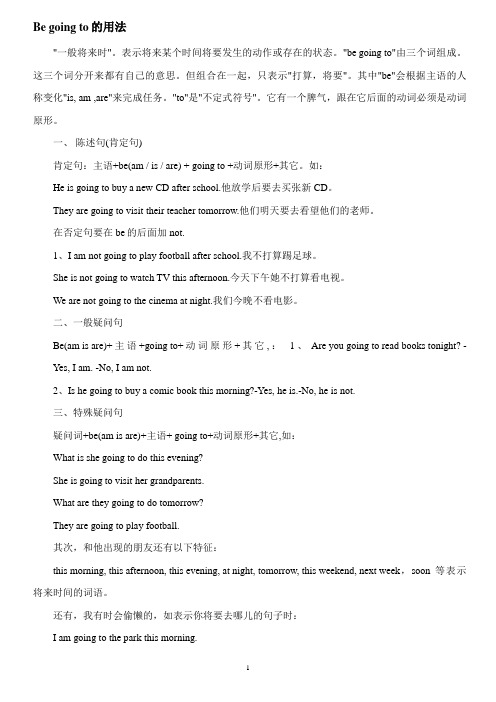
Be going to的用法"一般将来时"。
表示将来某个时间将要发生的动作或存在的状态。
"be going to"由三个词组成。
这三个词分开来都有自己的意思。
但组合在一起,只表示"打算,将要"。
其中"be"会根据主语的人称变化"is, am ,are"来完成任务。
"to"是"不定式符号"。
它有一个脾气,跟在它后面的动词必须是动词原形。
一、陈述句(肯定句)肯定句:主语+be(am / is / are) + going to +动词原形+其它。
如:He is going to buy a new CD after school.他放学后要去买张新CD。
They are going to visit their teacher tomorrow.他们明天要去看望他们的老师。
在否定句要在be的后面加not.1、I am not going to play football after school.我不打算踢足球。
She is not going to watch TV this afternoon.今天下午她不打算看电视。
We are not going to the cinema at night.我们今晚不看电影。
二、一般疑问句Be(am is are)+主语+going to+动词原形+其它,:1、 Are you going to read books tonight? -Y es, I am. -No, I am not.2、Is he going to buy a comic book this morning?-Y es, he is.-No, he is not.三、特殊疑问句疑问词+be(am is are)+主语+ going to+动词原形+其它,如:What is she going to do this evening?She is going to visit her grandparents.What are they going to do tomorrow?They are going to play football.其次,和他出现的朋友还有以下特征:this morning, this afternoon, this evening, at night, tomorrow, this weekend, next week,soon等表示将来时间的词语。
- 1、下载文档前请自行甄别文档内容的完整性,平台不提供额外的编辑、内容补充、找答案等附加服务。
- 2、"仅部分预览"的文档,不可在线预览部分如存在完整性等问题,可反馈申请退款(可完整预览的文档不适用该条件!)。
- 3、如文档侵犯您的权益,请联系客服反馈,我们会尽快为您处理(人工客服工作时间:9:00-18:30)。
一、be going to 的用法点拨
be going to 是一种固定结构,它后面要接动词原形,用来表示按计划或安排要发生的动作,有时也可以表示推测将要或肯定会发生的动作,有"准备;打算"的意思。
含有be going to 结构的句子中往往有表示将来的时间状语。
例如:
We are going to have a class meeting this afternoon.今天下午我们打算开班会。
(安排)
Look at the black clouds. It's going to rain.看那些乌云,快要下雨了。
(推测)
二、be going to 在肯定句中的形式
be going to 结构中的助动词be很少用原形,它一般有三种形式,即:am , is , are 。
当主语是I 时用am ;当主语是第三人称单数时用is;当主语是其他人称时用are。
例如:
I am going to buy something tomorrow morning.明天早上我要去买些东西。
She is going to see Mr. Wang this afternoon.她打算今天下午去看望王先生。
三、含be going to 的句子变否定句和一般疑问句的变法
由于句子中有助动词be,因此be going to 的否定句和一般疑问句的构成很容易,即在be (am, is, are) 的后面加上not 就构成了否定句;把be (am, is, are) 放到句首,在句末加问号就构成了一般疑问句,其答语为:Yes, 主语+ am/is/are. / No, 主语+ isn't/aren't. / No, I'm not.不过I am... 在改为一般疑问句时常常改为"Are you ....?"。
例如:
They are going to see the car factory next week. (肯定句)
They are not going to see the car factory next week. (否定句)
-Are they going to see the car factory next week?
-Yes, they are. (No, they aren't.) (一般疑问句及其回答)
四、使用be going to 应注意的两点
1. There be 句型的be going to 结构为:There is / are going to be... (注意句型中going to 后面的be不能改为have。
) 常用来表示将有某事发生。
例如:
There is going to be a football match next Saturday in our school.下周六我们学校将有一场足球比赛。
2. come, go, leave, arrive等表示位置移动的动词常用现在进行时表示将要发生的动作,它们很少与be going to 结构连用。
例如:
Miss Sun is coming tonight.今晚孙小姐要来。
